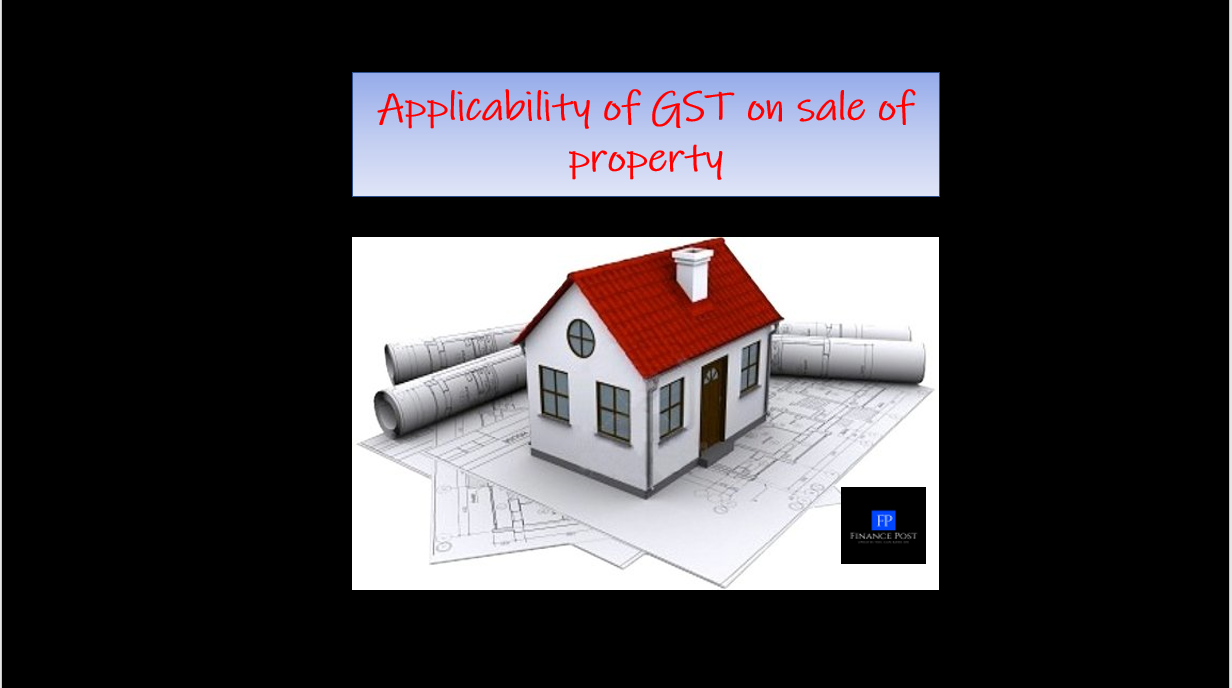
Last updated on March 17th, 2021 at 11:05 pm
Applicability of GST on sale of property
The real estate industry is one of the major contributors to the GDP and job creation in the Indian economy. GST has replaced the multiple levels of taxation (like VAT and service tax) and their cascading effect. Let’s understand the implication of GST on real estate transactions under the GST regime.
No GST on the sale of flats with completion certificate
The Government has issued a press release dated 8th December 2018 to clarify that there will no levy of GST
- On the sale of complex or building or/and
- Ready to move-in flats/property
where the sale takes place after the completion certificate is granted by the competent authority. As such sale will be covered as a supply of the good or a supply of service as per SCHEDULE III of CGST Act,2017.
Note: Even in the pre-GST regime, VAT was not applicable on the sale of completed or ready-to-move-in/sell properties.
Note: For applicability of GST levy, One needs to verify whether a completion certificate is issued at the time of sale.
Note: GST shall be calculated on the value excluding the stamp duty and registration charges.
Before the GST regime
Builders were not allowed to claim any credit of taxes i.e. VAT or/and Central Excise duty paid on inputs for payment of output tax liability. The builder had to pay central excise on most of the construction materials ranging between 12.5% to 14.5% VAT. For a builder, the goods (input) constitute approximately 45% of the final value (flat/property). And as mentioned, builders were not allowed any input tax credit claim for the taxes paid which ultimately leads to embedded ITC in the value of the final product. (which was approximately 10 – 12%.).
The outward tax rate applicable to builders on the sale of the property was
- Service Tax: 4.5%
- VAT: 1% to 5% (composition scheme)
Hence in the pre-GST regime, the effective tax rate applicable to builders was approx 15-18% ( i.e ITC forgone + service tax and VAT).
After the GST regime
After the implementation of the GST regime, builders are now allowed to claim the credit of taxes paid on inputs and/ or input services for payment of output tax liability subject to certain exceptions. The builder has to pay GST of 18% or more on all major construction materials, capital goods and input services used for the construction of flats, houses, etc. For a builder, the goods (input) constitute approximately 45% of the final value (flat/property). Now the builder is allowed to avail the weighted average of ITC incidence is approximately 8 to10%.
Note: In case of overflow of ITC, no refund will be granted for the same.
The outward GST tax rate applicable to builders on the sale of the property was
Affordable Housing Segment – 8%
Housing projects such as Jawaharlal Nehru National Urban Renewal Mission, Rajiv Awas Yojana, Pradhan Mantri Awas Yojana or any other housing scheme of State Government, etc. are considered to be a part of the Affordable Housing Segment. The builder or developer will not be required to pay GST in cash for most of the affordable housing segment projects. Generally, there will be enough ITC in his books of account to offset the output GST.
Other Housing Segment – 12% after 1/3rd abatement of the value of land
Housing projects other than the affordable segment as mentioned above, it is expected that the cost of the complex/ buildings/ flats would not have gone up after the implementation of GST. The builders or developers are also required to pass on the benefits of the lower tax burden to the buyers of property by way of reduced prices/ installments, where effective tax rate has been down.
Conclusion
It can be rightly said that there is no increase in either the affordable segment and for other segments after the implementation of GST. Stamp duty and registration charges will continue to be applicable on both completed properties and under-construction properties as they were applicable before the rollout of GST. GST shall be levied on the sale of under-construction property or/and ready-to-move-in flats/property where the sale takes place before the completion certificate has been issued by the competent authority.
You may also like:
- Applicability of GST on a Co-operative Housing Society
- GST and Accounting Standards (AS / IndAS) Differences
- Revenue recognition – Differences between GST law and GAAP
- What is the due date for Annual Return under GST?
- Download the GSTR 9A in PDF format
- Applicability of GST Audit
- GST Audit
- Annual Return of GST
- GST: Advance Ruling
- Non-filers under the GST regime
- 50th GST Council Meeting - 11/07/2023
- GST Compliance Calendar of October 2023 - 01/04/2023
- GST sections amended in Finance Act 2023 - 27/03/2023
Disclaimer: The above content is for general info purpose only and does not constitute professional advice. The author/ website will not be liable for any inaccurate / incomplete information and any reliance you place on the content is strictly at your risk.
Follow us on Social Media by clicking below
Follow @financepost_in
Be the first to comment